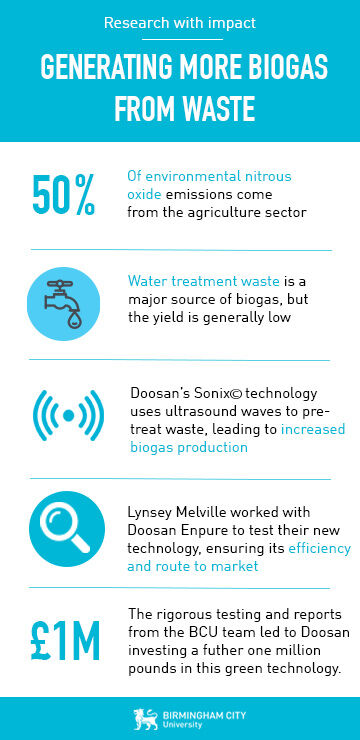Lynsey Melville’s work with industry leader Doosan Enpure has been vital in perfecting environmentally efficient and profitable waste-to-energy solutions that have the potential to impact stakeholders, end-users and the environment.
Research summary
Conservation of our natural resources and ethical waste practices are fast becoming necessary pillars of our society. From homeowners to multi-national businesses, people are becoming more aware of their environmental impact and are looking for responsible solutions. Doosan Enpure is an engineering company that specialises in the kind of waste-to-energy solutions that will be vital for the economy of the future. When the company developed its pioneering waste treatment technology, they consulted with Birmingham City University to test and refine their solution.
Research background
The agricultural sector is responsible for more than 40% of environmental methane emissions and more than 50% of nitrous oxide emissions. Given the current climate emergency, these numbers require a dramatic reduction. One such way to reduce these emissions is to make positive use of biological waste products through biogas conversion, but the efficacy of this process is entirely dependent on the economic benefits of biogas yield versus the time and cost of production. To accomplish this, Doosan developed new technology which treats waste material with ultrasound waves before undergoing biogas conversion, resulting in increased yields and better efficiency.
As with any new business venture, Doosan Enpure needed to be sure their Sonix technology delivered consistently high performance. Dr Lynsey Melville’s work in testing and measuring their new pre-treatment technology gave Doosan and their internal investors, Korea-based Doosan Corporation, the confidence they needed to go to market and invest in the technology.
Research outcomes
Dr Lynsey Melville’s work with Doosan Enpure has increased the efficacy of their technology and provided research which has seen substantial £1M investment, giving the technology definite routes to market. The research findings also have the potential to produce longer-term impacts that may help to solidify Doosan Enpure’s place in the market. As a result of successful trials, the company now has the tools to increase its market share in the field of pre-treatment technologies for biogas operators.
Proven and facilitated by the research, the optimised technology has enabled end-users to improve their process performance and increase revenue by generating higher yields from their waste material. This allows them to sell more energy back to the grid, leading to a direct increase in revenue.
As a result of Sonix technology, and the robust academic trials performed by Birmingham City University, biogas conversion is now a more attractive economic prospect due to increased yields. Optimisation of the technology has led to improved performance for end-users and subsequently more efficient conversion of waste to energy. This has the potential to lead to reduced CO2 emissions as a greater proportion of the waste is converted to methane. Also, as biogas conversion becomes a more attractive prospect, the research could lead to decreased reliance on fossil fuels.


